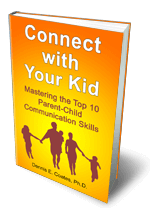Teenagers know they’re growing up, and they don’t like being treated like little kids.
They need the wisdom and guidance of parents and other adults.
But they hate lectures, sarcasm, put-downs, screaming, commands, threats, ultimatums, shaming, judging, and blaming.
Don’t you?
Letting frustration and impatience get the better of you leads to this kind of communication.
They’re already pushing for more independence, and talking to them like this pushes them away.
It puts your relationship with your child in jeopardy.
It puts the success of your parenting in jeopardy.
There are best, most effective ways to listen, give feedback, encourage, guide learning and stimulate thinking.
Very few parents have these skills.
We weren’t taught them when we were growing up.
We picked up how we communicate unconsciously, “on the street,” so to speak.
As parents, they aren’t serving us well.
Very few parents appreciate how ineffective their communication skills are.
Very few parents appreciate that they can improve the way they communicate.
They don’t know what it takes.
They rationalize that the way they talk to their kids is good enough.
They rationalize they don’t have time to change.
But the stakes of ineffective communication are high.
The successful maturation of your child is at risk.
Your relationship with your child is at risk.
Effective communication skills make a huge difference.
Teenagers feel understood and respected.
The skills stimulate critical thinking during adolescence, while the window for laying the foundation for critical thinking is still open .
The skills strengthen the bond between parent and child.
They model effective adult-to-adult relationship skills.
Unconditional love and support are important, but effective parent-teen communication skills are a game-changer.
 More truth-telling about parent-teen communication.
More truth-telling about parent-teen communication.
My how-to book on improving communication skills: Connect with Your Kid: Mastering the Top 10 Parent-Child Communication Skills.
You can grow the bond with your child through better listening. Download the FREE ebook, Listening to Understand.

